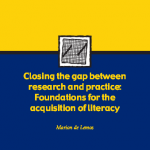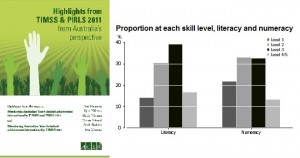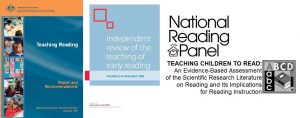Here are a few links to key information about the science of reading. This page is in no way comprehensive (the field is huge) but I hope it is an accessible start:
- Ending the Reading Wars: Reading Acquisition from Novice to Expert by Profs Anne Castles, Kathleen Rastle and Kate Nation reviews the science of learning to read and recommends instruction that is scientifically, developmentally and linguistically informed. Related articles and videos are here, here and here, and my blog post about a Prof Rastle seminar is here.
- Reading in the Brain by Stanislas Dehaene. Watch him on video here and here, and my blog post about a Prof Dehaene seminar is here.
- Effective reading Instruction in the early years of school is a plain-English, 18-page 2017 report and audio file by NSW’s Centre for Education Statistics and Evaluation.
- Read all about it: Scientific Evidence for Effective Teaching of Reading by Melbourne’s own living encyclopaedia of the reading science, Dr Kerry Hempenstall, is freely available.
- Essentials of Assessing, Preventing and Overcoming Reading Difficulties by David Kilpatrick, is a useful, practical text, and Dr Kilpatrick has also co-edited a 2019 book called Reading Development and Difficulties.
-
Three presentations by David Kilpatrick at the 2017 Reading in the Rockies conference are available free online. For the time-poor, I have summarised them here, here and here.
- Early Reading Instruction: What science really tells us about how to teach reading, by Diane McGuinness. By the same author is Language Development and Learning to Read, which was out of print but seems to be available again.
- Articles by Louisa Moats (many available free online – just search by title and author). Two video lectures by Dr Moats are here and here.
- Language at the Speed of Sight by Mark Seidenberg.
- The US-based Reading League has a web page called What is the Science of Reading, a podcast and list of recommended books here. We have most of these books at the Spelfabet office, if you’re local and want to browse them, and we also have all Lyn Stone’s books.
- To find academic research on any topic, search on the key words using Google Scholar. This will usually show you a list of articles of relevance, and you’ll be able to read the abstracts, plus many academics are now making their work freely available online. Authors are also often willing to share their articles if contacted directly.
How literate are Australians? Recent large-scale international studies suggest that far too many Australians are struggling with reading and spelling. Click here for more information and links to these studies.
National inquiries into the teaching of reading have been held in Australia, the UK and the USA.
All the reports are online so you can read them yourself – click here for the links and what I regard as a few key excerpts.
Dyslexia reports
Dyslexia is part of Specific Learning Disability in the latest edition of the diagnostic manual used by medical and allied professions (DSM-5). In Australia and the UK there have been recent reports describing about the difficulties and needs of people with decoding problems. Click here for more information and the relevant links.
 Literature reviews
Literature reviews
A useful literature review on literacy-teaching in Australia was published by ACER in 2002, called Closing the gap between research and practice – foundations for the acquisition of literacy.
Scottish Studies – Clackmannanshire and West Dunbartonshire
Two key, long-term studies into literacy-teaching methodology in Scotland have been published in recent years and are worth highlighting – one conducted in Clackmannanshire and one in West Dunbartonshire. Click here for a brief overview and links to their reports.
Exercise caution
It’s often hard to know whether or not an approach is backed up by good evidence. Click here for more information to help you figure out what is likely to be effective, and what isn’t.





Hi Alison,
I enjoyed your talk at the LDA presentation of Maryanne Wolf. I remember you showed a review of research, from memory, about Levelled Literacy Intervention showing that it does not make much of an impact. Could you please send me this link?
I am an LDA consultant member who is doing Year One intervention in a school that has purchased all the F&P kits (against my recommendation). I have said it does not have good results and the head of English would like to see where I’ve got that idea from because she has only heard positive things!!
Kind regards,
Helen
Hi Helen, I put the links to the things I was talking about at the Wolf seminar in this blog post: http://www.spelfabet.com.au/2016/09/filling-the-gaps.
The F&P publicity all says that it’s research/evidence-based, but if you look at THEIR OWN RESEARCH (published on their website but not in a peer-reviewed journal, so whether we really call it research anyway is arguable), it found that improvements that could be attributed to the program were not statistically significant, see http://www.heinemann.com/fountasandpinnell/research/lliefficacystudyreport2012.pdf. But they bury this in a lot of verbiage explaining this away, and a lot of glossy marketing, because they know teachers are not taught how to critically evaluate research.
All the best, Alison C
[…] Research […]
[…] There is around 30 years of research to support a structured literacy (systematic synthetic phonics) approach. Study after study after study backs this approach. But don’t take my word for it, I encourage you to do your own reading – see here for links to some relevant literature https://www.spelfabet.com.au/research/ […]
[…] this approach. But don’t take my word for it, I encourage you to do your own reading – see here for links to some relevant […]
Hi Alison,
A while back I wrote to you asking if you had heard of research that states that phonological awareness training is not effective after the age of 9. It had been a statement I saw in a student’s Cognitive Assessment report. Since then, I wrote to the the Educational Psychologist who had made the statement and he gave me the following reference for the statement:
I believe I pulled that language from research outlined and guidance provided by the authors of the CTOPP. Do you have access to the manual for that assessment? To be 100% sure, though, I’d need to re-read the manual. It’s also possible I pulled it from the National Reading Panel reports.
In any case, between then and now, I also obtained and read the resource ‘Essentials of Dyslexia Assessment and Intervention’ by Nancy Mather that you might be interested in. If I recall correctly, she referenced this issue but wasn’t as definitive on the point; she used slightly different language to describe the research and guidance. As a result of reading her resource on the topic, I modified that statement that I often include in my reports (where relevant) to: ‘From about age nine and up research has found that it may be more helpful to appropriate instructional time to other areas of reading development than phonological instruction (instruction focused on sound activities only).’
Based on what I’ve read, that struck me as being more true than the first way of wording it. In my experience, people can get better with their phonological awareness (especially if provided intervention), and that would be a good thing. At the same time, though, I believe it is a fair point that some people make to emphasize phonics over phonological awareness training for older students especially if time and money are limited (which they typically are for all of my clients). I hope that helps, but please let me know if you’d like to chat further. Cheers, M
I could not find any reference to this in the CTOPP manual however I did find this quote in the MacqLit manual:
“It is generally accepted that the most effective time to focus on pure phonemic awareness is in the first year or two of schooling (Ehri et al, 2001). This is when phonemic awareness training has the greatest effect on the reading process. After this window of opportunity, the research indicates that phonemic awareness training as a discrete skill, and taught in isolation, has limited benefit and is best taught in the context of learning the corresponding graphemes. (Pogorzelski and Wheldall, 2002, 2005; Wheldall and Porgorzelski, 2003). ………However it is necessary to consider the nature of the reading deficit and the level of phonological awareness knowledge of individual older students when making decisions about whether to include phonological awareness practice as part of an intervention (Schuele and Boudreau, 2008, p8).
My question is how does this compare to the propositions by David Kilpatrick that older students almost always have phoneme awareness difficulties and will continue to struggle until this difficulty is corrected and that there is no age limitation on learning phoneme awareness and reading improvement?
I am also wondering what your thoughts are regarding synthetic phonic programs and advanced phonemic awareness. My understanding is that MacqLit only covers segmenting and blending, and only does this explicitly in the early levels of the program. Do you know of other synthetic phonic programs that incorporate instruction in advanced phonemic awareness?
I have recommended to the secondary school that I support that students who do not make expected progress with the MacqLit program be complete the PAST and that the one minute activities are incorporated into the program. I think it would be ideal if they incorporated the activities with all the students on the program. (The students may also be referred for language assessment and more indepth assessment using the CTOPP)
Kind Regards,
Karen
Hi Karen, Wow, that’s a big question. I think phonemic awareness is a biologically secondary skill, so it can be learnt at any age, but the older you get, the harder it is to learn, and to undo the habits of a weak reader (thinking about what words look like but not what they sound like, over-reliance on good oral language to compensate for poor decoding etc). I think the distinction that Kilpatrick makes between basic and advanced phonemic awareness/proficiency is relevant to the question of teaching phonemic awareness to older learners. There is very little point teaching most older learners to blend and segment words (basic PA). Most can already do that, and thus sound out words. However, they don’t remember the words because they don’t have advanced phonemic awareness/proficiency which allows for orthographic mapping. The lack of this skill is what the CTOPP-2 Elision test identifies in some kids, but as it’s an untimed test, the smart ones who can visualise letters and mentally manipulate them without thinking about sounds can still get a decent score on the CTOPP, even though they are slow at it. Their weaknesses show up more on the PAST test because it’s timed, and because the visualising-the-letters trick doesn’t work because it has items like ‘say sift, now change f to p’ with the correct answer being ‘sipped’.
I do have a CTOPP-2 in the office so I can look back at the manual, it’s a while since I read it, so I don’t recall what it says, sorry. I try to always work on PA using letters, e.g. using a lot of word chains (here’s slip, change it to slop, change it to lop, then lip, then limp, etc) where kids must work from sound to print, and games where they have to build words. Activities of this type are used extensively in Sounds-Write, and in Phono-Graphix, they are also in Little Learners Love Literacy (not really useful for older kids), and I’ve seen them in many other synthetic phonics programs. However, there do seem to me to be some kids who WILL NOT think about sounds unless you take away the letters, and I use David K’s oral-only PA activities with them, to force them to think about sounds. I also think that teaching older kids about morphemes and how to join them is very powerful, as most long words are built with them. I hope that makes sense and covers the main things you’ve raised. Let me know if not. Alison
[…] despite what anti-phonics campaigners might tell you). The reason is simple: proper research shows it’s highly […]
Hi Alison,
we are currently looking at trying to improve spelling in our Year 3 -6. We have been using ‘SMART Spelling’ as a basis, but our mid-year review/assessment has not shown any major improvement in our students’ results. We are now questioning what we should be doing.
We already use ‘Get Reading Right’ with our P – 2’s , which is a great synthetic phonics program.
Do you know of a good program for spelling we could use in 3 – 6?
Hi Debra, great to hear you’re using GRR, have you asked them what they suggest for older students? They know their scope and sequence better than I do and have almost certainly had other people asking about this. Spelling Mastery is an evidence-based program and Sounds-Write has a Years 3-6 course that might also be worth considering: https://sounds-write.co.uk/specialist-courses. You might also like to introduce Word Sums (see http://www.neilramsden.co.uk/microscope/introduction/sums.html) and/or use some of Jason Wade’s resources, see https://jwed.co.uk/2021/04/13/rootrepository. Morpheme Magic might also be worth a look. I guess if there is no perfect program that dovetails with GRR, you might want to mix and match resources to suit your phonics review/morphology scope and sequence.